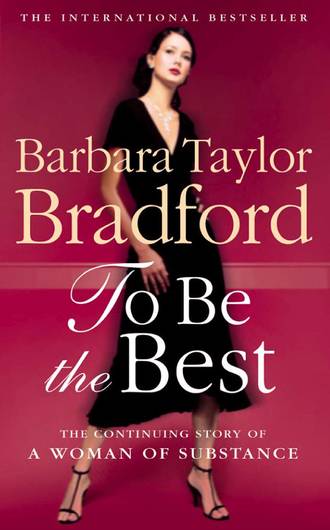
Полная версия
To Be the Best
After Maggie’s tragic death in the avalanche at Chamonix he had been grief-stricken and inconsolable for so long. Then slowly he had pulled out of it, had regained his self-possession, and, painstakingly, he had put himself back together. But it was as if he had assembled all of the pieces of himself in a new and wholly different pattern. He had not seemed quite the same ever again.
The avalanche affected us all, Paula reminded herself, thinking in particular of her brother, Philip. He had also been skiing on the mountain that day. But he had been the one family member who had lived … the sole survivor. And then there was her mother, who had lost a husband. And I lost a father; and my children lost a father. Yes, the avalanche wreaked havoc on the entire family. It damaged us, changed us, irrevocably. Each one of us has been decidedly odd ever since …
She began to laugh under her breath. And me most of all, she thought, as she endeavoured to shake off that sense of unease she had felt about her cousin a moment ago. Wasn’t she being overly imaginative, perhaps? After all, she and Sandy had been close as children, had remained close over the years. If there truly was something troubling him, he would have confided it to her on the telephone. I’m being irrational about this, she decided, and made a resolute effort to dismiss her worries about Alexander.
Her gaze came back to the papers on her desk.
The quickest of glances told her there was nothing particularly urgent to be dealt with, and she was relieved. Problems that arose on Fridays usually had a way of impinging on her weekends – and ruining them. This did not matter so much in the winter, but in the summer, when the children were home from their respective schools for a long period, it was distressing for them. They treasured their weekends with her, guarded them jealously, and resented any intrusions on their time, just as she did.
Once she had read the morning’s mail and a memorandum from Jill, which detailed suggested structural changes in the Designer Salon, she checked the pile of purchase orders, then reached for the telexes. All had emanated from the New York store and were signed by her American assistant, Madelana O’Shea. They had come in late last night and only one required an answer.
Pulling a yellow pad towards her, Paula began to draft a reply. When this was done, she opened the thickest of the folders she had brought with her from Yorkshire and took out the top sheet of paper. It was the only thing which interested her at this moment. On it were the salient points of her master plan. A single sheet of paper … but it was the key to so much … the key to the future.
Within seconds she was so immersed in her work, so busy making additional notes on the pad, that all thoughts of her cousin Sandy fled. But months later Paula was to recall this day only too well. She would remember her uneasiness about him with great clarity, and she would fervently wish she had paid more attention to her intuition. Most of all, she would bitterly regret that she had not pressed him to confide in her. Knowing about his problems would not have enabled her to change the inevitable outcome, but at least she could have revised her travel plans. In so doing she would have been able to help him, simply by being there for him whenever he needed her.
But on this scorching morning in August of 1981, Paula had no way of knowing any of this, and that sense of impending trouble – a foreboding almost – which she had experienced earlier had already been squashed by the force of her will. Also, like her grandmother before her, she had the enviable knack of pushing everything to one side in order to concentrate on her business priorities, and this she now did. Head bent, eyes riveted on the page, she fell deeper and deeper into her concentration, as always so totally absorbed in her work that she was oblivious to everything else.
Twenty minutes later, Paula finally lifted her head, stapled her notes together, and put them in the folder along with the single sheet of paper; she then locked the folder in the centre drawer of her desk for safe-keeping over the weekend. Half smiling to herself, satisfied that she had thought of everything and was prepared for any contingency, she sat holding the key for a split second longer before placing it carefully in her briefcase.
Pushing the chair back, she rose, stretched, walked across the floor, feeling the need to move around. Her body was cramped, her bones stiff from sitting – first in the Aston Martin and then here at her desk. She found herself at the window and parted the curtains, looked down into Knightsbridge below, noticed that the traffic appeared to be more congested than ever this morning, but then Fridays were usually wicked in the summer months.
Turning, Paula stood facing the room, a look of approval washing over her face. From her earliest childhood days she had loved this office, had felt comfortable within its confines. She had seen no reason to change it when she had inherited it from her grandmother, and so she had left everything virtually intact . She had added a few mementoes of her own and photographs of her children, but that was the extent of it.
The office was more like a drawing room in an English country house than a place of business, and this was the real secret of its great charm. The ambiance was intentional. It had been created by Emma Harte some sixty-odd years earlier when she had used valuable Georgian antiques and English oil paintings of great worth instead of more prosaic furnishings. Classic chintz fabrics on the sofas and chairs and at the windows introduced glorious colour against the pine-panelled walls, while antique porcelain lamps and other fine accessories lent their own touches of elegance and distinction. The decorative look aside, the room was spacious and graceful, and it had a beautiful old Adam fireplace which was always in use on cold days. The office never palled on Paula, and she was delighted when people entering it for the first time exclaimed about its beauty.
Like everything else she did, Grandy got this room exactly right, Paula thought, walking across the priceless Savonnerie carpet, drawing to a standstill in front of the carved pine fireplace. She gazed up at the portrait of her grandmother which hung above it, painted when Emma had been a young woman. She still missed her, intensely so at times, but she had long drawn comfort from the feeling that Emma lived on in her … in her heart and in her memories.
As she continued to stare at that lovely yet determined face in the portrait, she experienced a feeling of immense pride in Emma’s extraordinary achievements. Grandy started out with nothing and created one of the greatest business empires in the world … what incredible courage she must have had at my age. I must have her kind of courage and strength and determination. I must not falter in what I have to do … my master plan must succeed just as her plan did. Paula’s mind raced, leapt forward to the future, and she filled with excitement at the thought of what lay ahead.
She returned to her desk, realizing she must get on with the day’s business.
She flipped on the intercom. ‘Jill …’
‘Yes, Paula?’
‘My things were brought up from the car, weren’t they?’
‘Some time ago, actually, but I didn’t want to disturb you. Do you want me to bring everything in now?’
‘Please.’
Within seconds Jill’s bright auburn head appeared around the door and she hurried through into Paula’s office, holding aloft Paula’s garment bag in one hand, a suitcase in the other. Jill was tall, well built, an athletic type of young woman, and she appeared to manage these items with the greatest of ease.
‘I’ll put these in your dressing room,’ she said.
‘Thanks,’ Paula murmured, and when her assistant returned to her office, she went on, ‘Sit down for a minute, would you, please, Jill? I’d like to go over a couple of things with you.’
Jill Marton nodded, took the chair on the other side of the desk, sat watching Paula through warm and intelligent brown eyes. Jill had worked for her for over five years and she never ceased to admire her, forever marvelling at her extraordinary energy and stamina. The woman opposite her was a powerhouse – astute, inspired and frequently daring in business. Jill had never worked for anyone like her. Those at the store who had known the legendary Emma said that Paula was a chip off the old block. Jill suspected this was the truth, that the traits she so admired in her boss were inherited from the famous founder of the Harte chain. Yes, it’s all in the genes, Jill thought, continuing to observe Paula surreptitiously.
‘Ah, here it is … your memo about the Designer Salon,’ Paula said, picking up the piece of paper she had been searching for on the desk.
Jill sat up straighter in her chair, looked at Paula with alertness. ‘I hope it makes sense to you,’ she said.
‘It does indeed. Your recommendations are excellent. I’ve nothing to add. You can put the structural alterations into work immediately and make the other changes as well. They’ll do wonders for the salon, Jill.’
On hearing this compliment Jill felt vivid colour staining her neck and cheeks, and with a flush of pleasure she took the memo which Paula had slid across the highly-polished surface between them. She said, ‘I’m so glad you approve,’ and beamed.
Paula returned her smile. ‘Send this telex to Madelana later, and here’s the morning mail … nothing important, as you already know. You can deal with it easily. I’ve initialled these purchase orders.’ She tapped them with a bright-red finger nail, then asked, ‘Now, did any of last week’s advertisements come up from the art department yet?’
Jill shook her head. ‘But they’ll be on your desk immediately after lunch. I spoke to Alison Warren earlier, and they’re almost ready.’
‘Good. And speaking of lunch, did Michael Kallinski confirm? Or let you know where I’m supposed to meet him?’
‘He called a bit earlier. He didn’t want me to bother you, since you’d just arrived when he rang. That’s why I didn’t put him through. He’s picking you up at twelve-fifteen.’
‘Oh.’ Paula looked at her watch, rose and walked over to the dressing room, paused at the door, glanced down at her wrinkled cotton slacks. ‘In that case, I’d better change. I want to go out onto the floor, check a few things before Michael arrives, and I don’t have too much time. Excuse me, Jill.’
‘Of course.’ Jill scooped up the papers on the desk and headed to her own office. ‘Let me know if you need anything.’
‘I will,’ Paula said, closing the door behind her.
The dressing area had been the filing room in Emma’s day, but Paula had revamped it, adding floor-to-ceiling closets with mirrored doors, excellent lighting and a dressing table. She sat down at this, freshened her make-up and brushed her hair, then she slipped out of the shirt, trousers and sandals she had worn for driving from Yorkshire.
Within seconds she was dressed in the clothes she had brought with her in the garment bag: a black silk shantung suit, designed especially for her by Christina Crowther, classically simple, tailored and smart, worn with a white silk camisole, dark, very sheer stockings and high-heeled black patent pumps. The jewellery she added was equally simple but effective: a three-strand pearl choker with a diamond clasp at the front encircled her neck, and large mabé pearl studs ringed with diamonds glittered on her ears.
Staring at herself in the mirror, eyeing her reflection critically, Paula decided she liked the way she looked. The suit was crisp and businesslike without being overly severe and was therefore perfect for the store; it was also chic enough to go to lunch at an elegant restaurant. And no doubt they would be going somewhere smart. Michael always took her to the best places.
The staff elevator carried her rapidly down to the main floor.
Paula crossed the jewellery department and headed in the direction of cosmetics and perfumery, looking about as she did.
The store was crowded this morning.
But then it was generally thronged with shoppers from the moment it opened its doors at ten until it closed them at six. Over the decades it had become a famous landmark in London, and people from all over the world flocked through its great portals, to walk around its renowned halls and simply look as well as to buy the merchandise.
Paula loved the bustle, the activity, the crowds, the high-pitched buzz of the voices, so many of them foreign, the excitement that seemed to hang in the air. She usually experienced a small thrill when she returned after an absence, however short it had been, and this morning was no exception. The Yorkshire shops were important entities in the chain, just as those in Paris and New York were, but this was the flagship, and the one she loved the most.
Emma Harte had opened it in 1921.
In three months they would be celebrating its sixtieth anniversary. And what a celebration she had planned. It would be a tribute to her grandmother, one of the greatest merchant princes who had ever lived, as well as a salute to sixty years of superlative retailing and a record unchallenged by any department store, in any city, in any country in the world. Harte’s of Knightsbridge was the best. The only one of its kind. A legend.
A sense of exhilaration at being back on this very special territory, her favourite bit of turf, brought an extra spring to her step as she walked into perfumery and drew to a stop.
Eagle-eyed as always, she stood seeking out imperfections but found none. This pleased her. The area had recently been redesigned under her close supervision and even though she said so herself, the results were smashing.
Glass panels etched in the manner of Lalique, many mirrors, masses of chrome and silver accents, crystal chandeliers and wall sconces … all these elements combined to create a shimmering effect that was stunning. The scheme made the perfect backdrop for the eyecatching displays of cosmetics, perfumes and beauty products. Opulent, glamorous, inviting, the department was designed to lure women into spending tons of money, and it had succeeded brilliantly, just as she had known it would when it was still on the drawing board.
Good merchandising and marketing, that’s what it’s all about, Paula thought, moving on briskly, making a detour through lingerie on the way to the Rayne-Delman shoe salon. She was revelling in her morning walk through her store … the finest department store in the world. It was the seat of her power, her strong citadel, her pride and joy. In fact, it was everything to her.
Chapter 2
For the second time that morning the portrait of Emma hanging in Paula’s office was undergoing a close and fixed scrutiny.
The man who had just drawn to a standstill in front of it was in his late thirties, fair-haired with light blue eyes and a summer tan. He stood about five feet eight, but appeared taller because of his lean, trim build. Also, his clothes added to the illusion of height. He wore a white shirt and a burgundy silk tie, and his dark blue suit, made of the finest imported raw silk, was so flawlessly cut, so unerringly tailored, it hung on him perfectly, was obviously a work of art from Savile Row.
His name was Michael Kallinski and he stood examining the alluring face captured in oils on the life-sized canvas, his eyes narrowed in concentration as he ruminated on the formidable Emma Harte.
It suddenly struck him as quite curious that a woman who had been dead for over a decade – eleven years to this very day to be exact – was always spoken about as if she were still alive, and by most people at that, not merely her immediate family. He supposed that someone of Emma’s charisma and brilliance, who had made such a vivid and powerful impact in her lifetime, would be on the short list for immortality. After all, the dent she had made on the world – in her personal relationships, in international business and through her many philanthropies – was enormous.
Michael stepped back, tilted his head to one side, trying to ascertain how old Emma had been when she had sat for this portrait. Most probably in her late thirties, he decided. With her chiselled features, flawless complexion, reddish-gold hair and those extraordinary green eyes, she had been a great beauty as a young woman: there was no doubt about that whatsoever.
Little wonder his own grandfather had been madly in love with her those many years ago, and ready and willing to leave his wife and children for her – according to Kallinski family gossip, at any rate. And from what he understood from his father, David Kallinski had not been the only man to fall under her mesmeric spell. Blackie O’Neill had apparently been bewitched by her, too, in their youth.
The Three Musketeers. That’s what Emma had called them – his grandfather, Blackie and herself. In their early days together, at the turn of the century, they had been considered an unlikely trio … a Jew, an Irish Catholic and a Protestant. Seemingly they had not paid much attention to what people thought of them or their friendship, and they had remained close, almost inseparable, throughout their long lives. And what an unbeatable trio they had proven to be. They had founded three impressive financial empires which straddled half the world and three powerful family dynasties which only went from strength to strength with the passing of time.
But it had been Emma who had been the real mover, the doer and the shaker, always pushing ahead with vision and enterprise, the two men following her lead. Anyway, that was the way his father told it, and he had no reason to disbelieve him. And he knew from his own experience of her that Emma had been absolutely unique. As far as the younger members of the three clans were concerned, she had certainly left her imprint on each one of them, himself included. Her indelible stamp, his father called it.
Michael smiled to himself, remembering exactly how Emma had been thirty-odd years ago … rounding them up as children and carting them off to Heron’s Nest for the spring and summer holidays. They had called her ‘The General’ behind her back, and the house in Scarborough had been affectionately referred to as ‘the army camp’. She had put them through their paces and instilled in them her own philosophy of life, had taught them the meaning of honour and integrity, the importance of the team spirit and playing the game. And all through the years of their growing up she had given unstintingly of her love and understanding and friendship; they were better people now for having known her then.
A look of love washed over his face, and he touched his hand to his forehead, gave the portrait a small salute. She had been the very best … just as her granddaughters were the best. A rare breed, the Harte women, all of them, and most especially Paula.
The sound of the door opening prompted him to swing around quickly.
His face lit up at the sight of Paula.
‘I’m sorry to have kept you waiting!’ she exclaimed, looking apologetic, hurrying forward to greet him.
‘You didn’t, I was early,’ he replied, going to meet her in the centre of the floor. He gave her a huge bear hug, then held her away, stared down into her face. ‘You’re looking wonderful.’ He glanced over his shoulder at the portrait, then brought his gaze back to hers. ‘And you’re beginning to resemble that legendary lady more than ever.’
Paula groaned, gave him a look of mock horror as they drew apart.
‘Oh God, Michael, not you too! Please. There are enough people who call me the Clone behind my back without you giving voice to the idea.’ She shook her head. ‘That’s all I need from a dear friend …’
He burst out laughing. ‘I sometimes think you’re all clones, actually. The lot of you … Emily and Amanda, as well as you.’ He swivelled to face the portrait. ‘And when was that painted, by the way?’
‘In 1929. Why?’
‘I’d been trying to figure out how old Emma was when she sat for it.’
‘Thirty-nine. It was started and finished just before her fortieth birthday.’
‘Mmmm. I guessed as much. And she was beautiful then, wasn’t she?’ Not giving Paula a chance to reply, he went on, with a small grin, ‘Do you realize that you and I would have been related if David had left my grandmother Rebecca and run off with Emma?’
‘Let’s not get into all that old history today,’ she said with a light laugh, moved rapidly towards the desk, sat down and added, ‘Anyway, I feel as if we are, don’t you? Related, I mean.’
‘Yes.’
He followed her across the room and seated himself in the chair facing her.
There was a brief silence, then he remarked quietly, ‘Blood might not be thicker than water as far as some families are concerned, but it is when it comes to the three clans. Our grandparents would’ve killed for each other, and I think their kind of loyalty has been passed down to our generation, hasn’t it?’
‘I should say so – ’ She cut herself short when the phone rang and reached to answer it. After saying hello and listening for a second she put her slim, tapering hand over the receiver, explained, ‘It’s the manager of the Harrogate store, I’ll only be a minute.’
He nodded, sat back in the chair, waiting for her to finish her call, quietly studying her as he had studied the painting only a few minutes before.
Michael Kallinski had not seen Paula for over two months, and because he had been away her uncanny resemblance to Emma had struck him more forcibly than ever when she walked in. Her colouring was different from Emma’s, of course. Paula had hair as black as pitch and eyes of the deepest darkest blue. She had inherited Emma’s clear, finely wrought features, though, and the famous widow’s peak, which was extremely dramatic above those large eyes set wide apart. With the passing of time the two women seemed to merge more and more, to become identical, to him at least. Perhaps it had something to do with the expression in Paula’s eyes these days, her mannerisms, her pithiness, the way she moved – swiftly, always in a hurry – and the habit she had of laughing at her misfortunes. These characteristics reminded him of Emma Harte, just as her attitude in business did.
He had known Paula his entire life and yet, oddly enough, he had not really known her until they were both in their thirties.
When they had been children he had not liked her one little bit, had considered her to be cold, standoffish and indifferent to them all, except for her cousin Emily, that roly-poly pudding of a child whom she had forever mothered, and Shane O’Neill, of course, whom she had always striven to please.
Privately, Michael had called her Miss Goody Two Shoes, because she had been just that, a child who appeared to have no faults whatsoever, one who was always being clucked over, praised and held up as an example to them by their respective parents. His brother Mark had had his own name for her … Paragon of Virtue. He and Mark had secretly laughed at her, made fun of her behind her back, but then again, they had scoffed at all the girls from the clans, had never wanted to spend time with them, had preferred to be roistering around with the other boys. They had banded together with Philip, Winston, Alexander, Shane and Jonathan, who had been their boon companions in those days.
It was only in the last six years that he had come to know Paula and he had discovered that this shrewd, hardworking and brilliant woman hid a deep emotional side behind her cool air and her inbred refinement. The aloof manner was merely an outward manifestation of her shyness and natural reserve, those traits he had so misunderstood in childhood.
Discovering that Paula was quite different than he had believed her to be had come as something of a shock to him. To his astonishment, he found she was so very, very human. She was vulnerable, warm, loving, fiercely loyal, and devoted to her family and friends. Terrible things had happened to her over the past ten years, devastating things which would have felled most other people, perhaps even destroyed them. But not Paula. She had suffered deeply, yet had found strength from adversity, had become a most compassionate woman.







